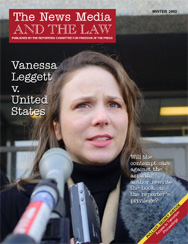October 17, 2011
Situation- You’re a reporter and you’ve just been assigned to write a story about drug use. While, with a story like that, the best way to tell it would be from the words of those who use drugs and know what they are talking about. So you go find said users, interview them and, after requested, tell them that they will remain annoymous in the story.
Soon after the story is published, you are approached by law enforcement agents who want to know the names of the people you interviewed for your story. eventually you get a subpoena to come to court, where you are ordered to give the names of your sources even though you promised them that their names would not be made public. What would you do? Do you have the right to protect the names of your sources even though it people who are breaking the law that you are protecting?
Legal Background- Branzburg v. Hayes (1972). Paul Branzburg was a reporter for the Louisville Courier-Journal. He wrote two articles that concerning drug use in Kentucky and during his research for the articles, he witness and interview several people who used marijuana. The sources all requested that not to be idenified. However, the articles soon reached the police, and soon Branzburg received a subpoena to appear before a grand jury. He was ordered to reveal the names, but refused. He citied privilege under the Press Clause, but was held in contempt for refusing to name the names.
The case went all the way to the Supreme Court. There the argument continued to be hotly debated until the Court finally made a decision. They voted 5-4 against the reporter and the existence of reporter privilege in the First Amendment. It was stated that this would have given newspaper writers testimonial privilege that other citizens did not have. However, the court also stated that the government “must convincingly show a substantial relation between the information sought and a subject of overriding and compelling state interest.”
Justice Powell, who sided with the majority, expressed that the decision had a “limited nature.” He said “…there is a privilege analogous to evidentiary one, which courts should recongnize and apply on case by case to protect confidential information. My vote turned on my conclusion… that we should not establish a constitutional privilege.”
Since then several lower courts have interpreted those words as indicating that reporter privilege does exist, but must be decided on each individual case. This means that in the specific case of Branzburg, there wasn’t enough for the privilege to apply, but it could apply to other cases with different circumstances.
Links-
2) http://scholar.google.com/scholar_case?case=11598860258825518787&hl=en&as_sdt=2&as_vis=1&oi=scholarr
Questions-
1) How do you think “Branzburg” would have been ruled today? The views toward drugs like marijuana have changed somewhat, with the access to medical weed.
2) While the court decided against reporter privilege. they left it somewhat open-ended. What cases since “Branzburg” have decided there is such a privilege and which ones have decided that there isn’t?
3) Do you think there are certain crimes and actions that reporters can cover and keep sources secret with the privilege? Are there cases that have defined what crimes, such as drug use, reporters can hold back their sources names and other crimes defined as not, such as more serious crimes like robbery or even murder?


